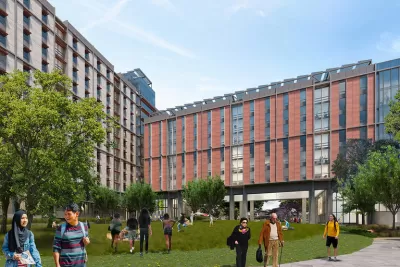The Board argues that the environmental law, while important, has too often been ‘weaponized’ by NIMBY groups to delay or halt housing development.

While the California Environmental Quality Act (CEQA) “has improved countless construction projects,” the Los Angeles Times Editorial Board argues that reform of the landmark law is desperately needed. According to the Board, “CEQA lawsuits have also too often been used to thwart progress on the state’s most pressing needs by stalling or blocking important projects.”
The Board provides an example from Berkeley, where a CEQA lawsuit is holding up the planned construction of hundreds of housing units for students and unhoused people in People’s Park. A district court ruled that the university did not conduct a thorough environmental review about the potential impacts of 1,100 student residents while ignoring the benefits of adding dense housing near campus. The Board writes that “That’s one of the pitfalls of CEQA — the law only considers the possible negative effects from a project, without giving equal weight to its benefits or the consequences if the project isn’t built.”
The Board argues that rather than creating piecemeal CEQA exemptions, such as the Berkeley project is likely to receive, state legislators should reform the law to promote development that makes sense. But the Board sees little political will to reform the law at the legislative level, urging instead that Governor Newsom “draft clear, broad exemptions for urban infill development and clean-energy projects.”
FULL STORY: Editorial: CEQA is too easily weaponized to block housing and slow environmental progress

Maui's Vacation Rental Debate Turns Ugly
Verbal attacks, misinformation campaigns and fistfights plague a high-stakes debate to convert thousands of vacation rentals into long-term housing.

Planetizen Federal Action Tracker
A weekly monitor of how Trump’s orders and actions are impacting planners and planning in America.

In Urban Planning, AI Prompting Could be the New Design Thinking
Creativity has long been key to great urban design. What if we see AI as our new creative partner?

King County Supportive Housing Program Offers Hope for Unhoused Residents
The county is taking a ‘Housing First’ approach that prioritizes getting people into housing, then offering wraparound supportive services.

Researchers Use AI to Get Clearer Picture of US Housing
Analysts are using artificial intelligence to supercharge their research by allowing them to comb through data faster. Though these AI tools can be error prone, they save time and housing researchers are optimistic about the future.

Making Shared Micromobility More Inclusive
Cities and shared mobility system operators can do more to include people with disabilities in planning and operations, per a new report.
Urban Design for Planners 1: Software Tools
This six-course series explores essential urban design concepts using open source software and equips planners with the tools they need to participate fully in the urban design process.
Planning for Universal Design
Learn the tools for implementing Universal Design in planning regulations.
planning NEXT
Appalachian Highlands Housing Partners
Mpact (founded as Rail~Volution)
City of Camden Redevelopment Agency
City of Astoria
City of Portland
City of Laramie





























